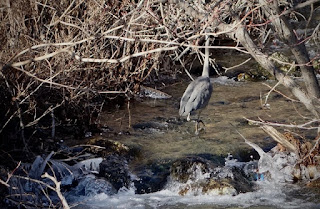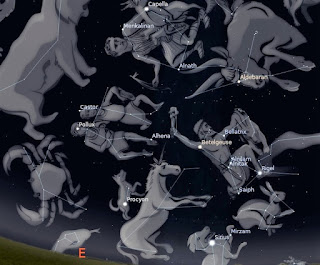NATURE
MONCTON NATURE INFORMATION LINE
Dec 17, 2021 (Friday)
To respond by e-mail, please address your message
to the information line editor, nelsonpoirier435@gmail.com
.
Please advise the editor at nelsonpoirier435@gmail.com if any of
For more information on Nature Moncton, check the website at www.naturemoncton.com
.
Edited by: Nelson Poirier nelsonpoirier435@gmail.com
**Dale
Halfpenny came across a Great Blue Heron foraging in the brook of the
golf course at Fundy National Park on Wednesday. It was looking very healthy,
and he saw it take small fish several times as well as getting some photos of
the action.
**Richard Perron
shares an excellent photo of the Western Conifer Seed Bug taken in October,
2019. It is a significant time to take note of this easily identifiable bug. It
tends to seek sheltered areas to overwinter and that sometimes means our homes.
It is of no danger to humans. The enlargements on the rear legs (tibia) is a
clue to identification.
The Western
Conifer Seed Bug is native to North America west of the Rocky Mountains however
it has expanded its range and is now being seen in Eastern Canada. It is able
to fly and makes a buzzing noise when they are airborne. It feeds on the sap of
developing conifer cones however is not recognized as a significant forest pest
in Eastern Canada at this point.
**It’s
Friday and time to review what next week’s sky may reveal including comet
Leonard all courtesy of sky guru Curt Nason:
**This Week’s Sky at a Glance, 2021 December 18 –
December 25
Having official constellations doesn’t prevent us from imagining our own. The
sight of Orion, with club raised high and a lion-skin shield warding off the
horns of a raging bull, has been etched in my memory for over half a century.
But, come December, reddish Betelgeuse in Orion’s armpit becomes Santa’s red
nose in profile, the curve of the shield outlines a sack of toys, and the
iconic three-star belt is…well, Santa’s wide black leather belt. And on cold,
clear nights there is no mistaking that twinkle in his eye. Look to the north
and there is Santa’s sleigh, usually seen as the Big Dipper, being loaded up
for the long night’s ride.
Many doors and windows are decorated with wreaths and the window of the winter
sky is no exception. Here, Betelgeuse is a red light near the middle of a
wreath we call the Winter Circle or Hexagon. By mid-evening you can trace the
lights decorating the wreath, from blue-white Rigel in Orion’s leg to brilliant
Sirius the Dog Star, up through Procyon the Little Dog Star, around Pollux and
Castor in Gemini and Capella in Auriga to orange Aldebaran as the Bull’s eye,
and back to Rigel. Imagination is a gift and Santa won’t mind if you open yours
before Christmas.
This Week in the Solar System
Saturday’s sunrise in Moncton is at 7:56 am and sunset will occur at 4:34 pm,
giving 8 hours, 38 minutes of daylight (7:58 am and 4:43 pm in Saint John).
Next Saturday the Sun will rise at 8:00 am and set at 4:38 pm, giving 8 hours,
38 minutes of daylight (8:02 am and 4:46 pm in Saint John). The Sun reaches its
most southerly point on Tuesday at 11:59 am, our shortest daylight of the year,
to kick off winter.
The Long Night’s Full Moon occurs on Sunday, taking 15 hours and 47 minutes to
cross the sky. There will be a lot of wolves with sore throats on Monday.
(Wolves don’t howl at the Moon, by the way, they just howl.) Mercury sets 35
minutes after sunset this Saturday and stretches that gap to an hour next
weekend. Venus is moving rapidly in the opposite direction and the two inner
planets cross paths on New Year’s Eve. Saturn sets at 8 pm midweek, followed by
Jupiter an hour and a half later. Mars can be seen with binoculars in the
morning sky, rising shortly after 6 am.
Comet C/2021 A1 Leonard might be seen in binoculars about a binocular-width
below Venus around 5:30 pm on Saturday. Over the week it passes southward along
the horizon at the same time, well below Saturn on Monday and Jupiter next
weekend.
Questions? Contact Curt Nason at nasonc@nbnet.nb.ca.
Nelson
Poirier
Nature
Moncton




